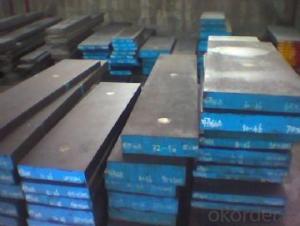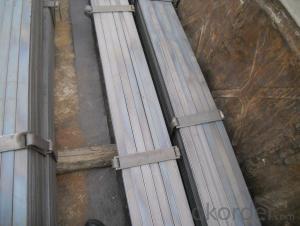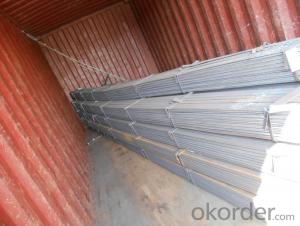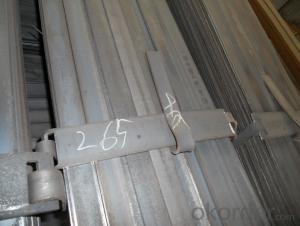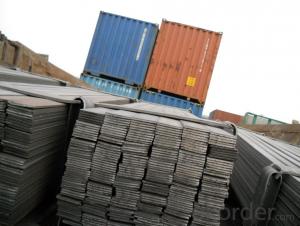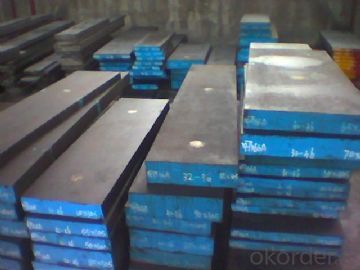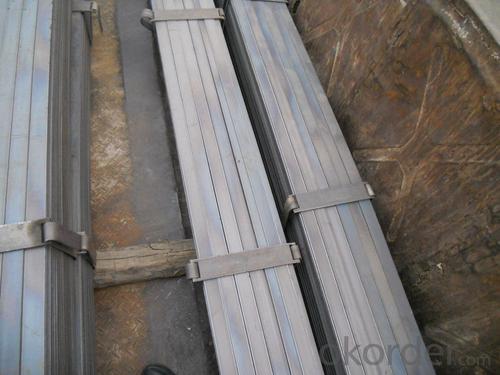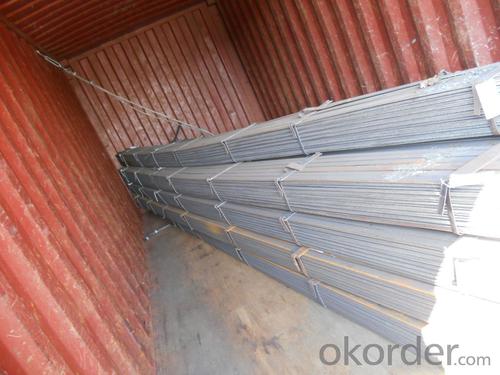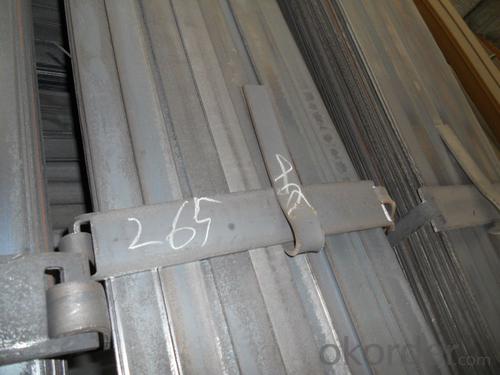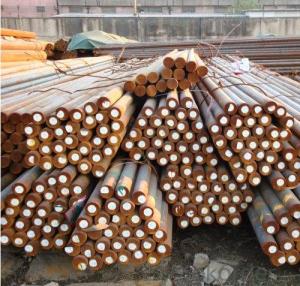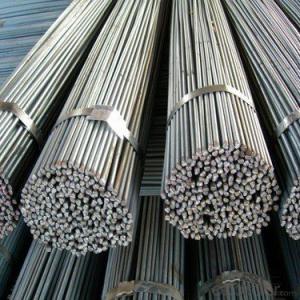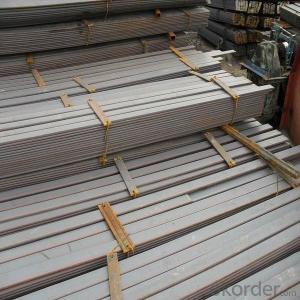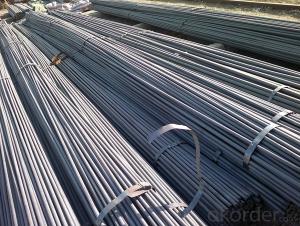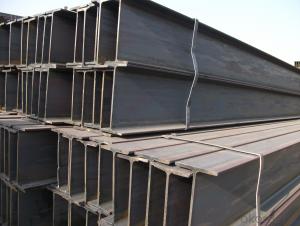Prime Hot rolled Spring Steel Bar/billet/products JIS standard/Europe standard/ ASTM standard
- Loading Port:
- Shanghai
- Payment Terms:
- TT OR LC
- Min Order Qty:
- 50 m.t.
- Supply Capability:
- 1200 m.t./month
OKorder Service Pledge
OKorder Financial Service
You Might Also Like
Specifications
Spring steel flat bar
Garde: 60Si2Mn, 60Si2MnA, 55CrMnA,50CrVA
Standard GB,JIS,ASTM,DIN,AISI,BS
LF & VD forge;ISO&TUV appr
Materials
Q195,Q215,Q235B,Q345B,
S235JR/S235/S355JR/S355
SS440/SM400A/SM400B
Product Category
Metallurgy,Mineral &Energy
Technique
HOT ROLLED
Packing
1.Big OD:in bulk
2.Small OD:packed by steel strips
3.woven cloth with 7 slats
4.according to the requirements of customers
Usage
Mechanical&manufacture,Steel strcuture,
Shipbuilding,Bridging,Automobile chassis
Main market
Middle East,Africa, Asia and some Uropean country and America ,
Australia
Country of origin
China
Productivity
15000 Metric Tons pet Month
Remark
Payment terms :T/T ,L/C
Terms of trade :FOB ,CFR,CIF ,DDP,EXW
Minimum order : 10 tons
Lead time :on or before 3-15 working days .
- Q: What are the applications of special steel in the manufacturing sector?
- Special steel has various applications in the manufacturing sector due to its unique properties. It is commonly used in industries such as automotive, aerospace, construction, and machinery. Special steel's high strength, corrosion resistance, and heat resistance make it ideal for manufacturing components like gears, shafts, bearings, and tools. Additionally, its ability to withstand extreme temperatures and pressures makes it suitable for applications in boilers, turbines, and pressure vessels. Overall, special steel plays a crucial role in enhancing the performance and durability of products in the manufacturing sector.
- Q: What are the different methods of surface thermal spraying for special steel?
- There are various techniques available for surface thermal spraying on special steel. These techniques consist of: 1. Flame spraying: This method involves melting the coating material using a flame or oxy-fuel source, and then spraying it onto the special steel surface. It is commonly utilized for applying coatings like zinc, aluminum, or their alloys. 2. Arc spraying: In arc spraying, the coating material is melted using an electric arc and then propelled onto the special steel surface using compressed air. This technique is often employed for applying coatings such as stainless steel, nickel alloys, or copper. 3. Plasma spraying: Plasma spraying employs a plasma torch to heat and melt the coating material, which is then propelled onto the special steel surface. It is especially effective for applying coatings with high melting points like ceramic or metallic materials. 4. High-velocity oxy-fuel (HVOF) spraying: HVOF spraying uses a high-pressure combustion process to propel the coating material onto the special steel surface. This technique produces coatings with high bond strength and density, making it suitable for applications that require wear resistance or corrosion protection. 5. Detonation spraying: Detonation spraying involves a controlled detonation process to accelerate the coating material onto the special steel surface. It is often used for applying coatings such as tungsten carbide or other hard materials, providing excellent wear resistance. Each of these surface thermal spraying methods offers unique advantages and is chosen based on the specific requirements of the special steel application, including the desired coating material, thickness, and performance characteristics.
- Q: How is bearing steel used in the manufacturing of bearings?
- Bearing steel is specifically designed for the manufacturing of bearings due to its high hardness, wear resistance, and excellent rolling contact fatigue strength. This type of steel is used to produce the inner and outer rings, as well as the rolling elements of bearings. It undergoes a specialized heat treatment process to enhance its mechanical properties and ensure proper microstructure. The use of bearing steel in manufacturing ensures the durability and longevity of bearings, allowing them to withstand heavy loads, high temperatures, and corrosive environments.
- Q: How is high-strength alloy steel used in the production of structural components?
- High-strength alloy steel is commonly used in the production of structural components due to its exceptional strength-to-weight ratio. It provides superior tensile strength and toughness, making it suitable for supporting heavy loads and withstanding high stress and impact. This steel is often used in the construction of buildings, bridges, and other infrastructure, as well as in the manufacturing of machinery and vehicles. Its application helps enhance structural integrity, durability, and safety while minimizing the weight and material requirements of these components.
- Q: Is special steel resistant to chemical corrosion?
- Yes, special steel is generally resistant to chemical corrosion due to its high levels of alloying elements such as chromium, nickel, and molybdenum. These elements form a protective layer on the steel surface that helps prevent the penetration of corrosive substances, making it highly resistant to chemical corrosion.
- Q: Can special steel be used in the aerospace defense industry?
- Yes, special steel can be used in the aerospace defense industry. It is commonly used for manufacturing various components and structures in aircraft and defense systems due to its high strength, durability, and resistance to extreme temperatures and corrosion.
- Q: How does special steel perform in terms of machinability?
- Special steel typically performs well in terms of machinability. It is specially designed to have improved cutting, drilling, and shaping properties, making it easier to work with using various machining processes. Special steel often has a more consistent composition and structure, which results in reduced tool wear, better surface finish, and increased productivity during machining operations.
- Q: How does tool steel maintain its hardness at high temperatures?
- Tool steel maintains its hardness at high temperatures due to its high carbon content and alloying elements. The high carbon content allows for the formation of carbides, which are extremely hard and stable even at elevated temperatures. Additionally, the alloying elements in tool steel, such as chromium, tungsten, and molybdenum, form secondary carbides that further enhance the steel's hardness and heat resistance. These carbides act as strengthening agents, preventing the steel from losing its hardness and maintaining its performance even under high-temperature conditions.
- Q: How is HSLA steel used in the construction industry?
- HSLA steel, or High-Strength Low-Alloy steel, is widely used in the construction industry due to its superior strength and durability. It is commonly utilized in the construction of bridges, buildings, and other infrastructure projects. HSLA steel's high tensile strength allows for the creation of lighter and more efficient structures, reducing material costs and environmental impact. Additionally, its resistance to corrosion and atmospheric conditions makes it suitable for outdoor applications, ensuring the longevity of the constructed assets.
- Q: How long does special steel typically last in various applications?
- The lifespan of special steel can vary in different applications due to various factors. Special steel is renowned for its remarkable strength, durability, and resistance to corrosion, making it suitable for a wide array of applications. However, the actual lifespan of special steel relies on the specific application, maintenance practices, and environmental conditions it encounters. In general, special steel can endure for several decades, or even longer, when utilized in industries like construction, automotive, aerospace, and manufacturing. For example, in building structures, special steel can remain intact for 50 to 100 years due to its robustness and ability to withstand extreme loads and weather conditions. In automotive applications, special steel components such as engine parts, suspension systems, and body frames can have a lifespan of 15 to 30 years, provided they are well-maintained and not subjected to excessive wear and tear. In the aerospace industry, special steel is commonly utilized in crucial components like turbine blades, landing gears, and fuselage structures. These parts undergo rigorous testing and inspection procedures and are designed to last for decades, typically around 30 to 50 years, before necessitating replacement or refurbishment. In manufacturing processes, special steel tools and dies can last anywhere from a few years to several decades, depending on factors such as the intensity of use, the material being processed, and the maintenance practices employed. Proper lubrication, cooling, and regular maintenance can significantly prolong the lifespan of these tools. It is important to note that the lifespan of special steel can be negatively impacted by factors such as exposure to harsh chemicals, high temperatures, aggressive environments, or inadequate maintenance. Consequently, regular inspections, maintenance, and adherence to recommended usage guidelines are crucial in ensuring the longevity of special steel in various applications.
Send your message to us
Prime Hot rolled Spring Steel Bar/billet/products JIS standard/Europe standard/ ASTM standard
- Loading Port:
- Shanghai
- Payment Terms:
- TT OR LC
- Min Order Qty:
- 50 m.t.
- Supply Capability:
- 1200 m.t./month
OKorder Service Pledge
OKorder Financial Service
Similar products
Hot products
Hot Searches
Related keywords
